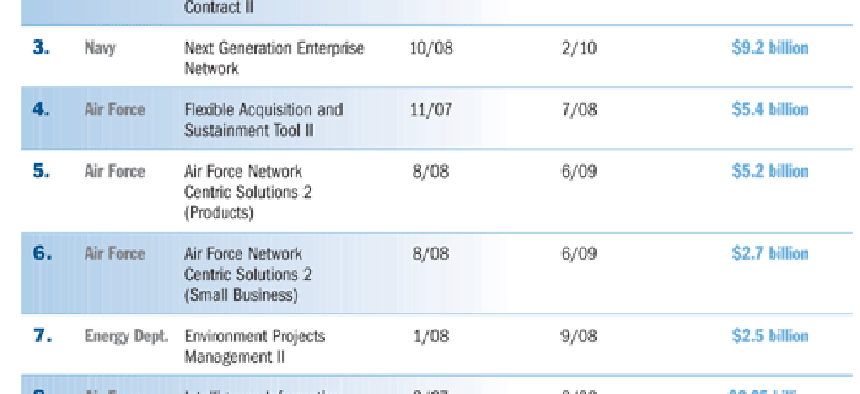A rough ride ahead

But 2008 has bright spots for existing projects entering new phases.
The federal information technologymarket is facing anothertough year in fiscal 2008, as thewar on terrorism saps dollarsand the lack of new appropriationsforces agencies to delayplans for new projects.The General Services Administrationhas awarded itslong-awaited Networx andAlliant contracts, closing offthose lucrative opportunities toall but the winners. Its Alliantsmall-business companion vehicleis yet to be announced.The agency expects to awardthat contract this month.But the outlook isn't all bleak.Agencies will issue requests forproposals on some major contractsin 2008. Not all will actuallybe awarded during the year,but companies should be readyto bid on those that are suitable,analysts say.The year will begin with alame-duck president and manyagencies still operating undercontinuing resolutions, thecongressional mechanism thatallows agencies to continueongoing activities while awaitingnew funding, said ArashArdalan, senior analyst of federalresearch at Input Inc.Ardalan and other Input staffearlier this month issued areport on the Top 20 FederalTechnology Opportunities in2008. The top six opportunitiesare with defense agencies andthe military. Of the top 20, 13 arewith the Defense Department."It doesn't look to be any onecommon trend driving thosedollars," he said. "New dollarspending doesn't look like it'sgoing to be there. It's a lot of[operations and maintenance]dollars. Keeping systems maintained? you've got a lot of that."Many of the big opportunitiesInput identified are recompetes? old contracts entering newphases and reopening competition.They are solid, nuts-andboltsIT projects without a lot ofsizzle, he said."In past years, we've hadsome real juicy opportunities inthe report," but not this year,Ardalan said. "You've got somelarger recompetes coming out,and big companies will be vyingfor the opportunities. I feel likecompetition is going to be reallytough."The pressure is on for companiesto convince agency leadersthat they offer the best value among competitors, he said."You've got your options outthere for you," he said. "Thepricing obviously will be a bigfactor. You're going out theretelling people you've got thebest price, you have to be able toshow people that's actually whatwill happen."Operating under continuingresolutions has become a normalpart of the budget cyclein recent years, said GregBaroni, president of the federalsystems division at Unisys Corp.Businesses have no choice butto adjust their cycles to match,he said."It's nothing new," he said. "IfI'm looking at the '08 appropriationscycle, it seems to be followinga path that's kind offamiliar. Not saying we appreciateit, but it appears to be nothingnew."Such stopgap measuresbecome just a normal part ofdoing businesses, he said. "Theissue that it really impacts isnew awards."Unisys will bid aggressivelyon some of Input's Top 20 list,he said. One is the HomelandSecurity Department's InformationTechnology and ManagedServices contract, the nextincarnation of which will beawarded in December 2008 andbe worth as much as $1 billion,Input said.The contract is for theTransportation Security Administration,a component ofDHS, and Unisys has held itsince TSA first awarded it in2002."That's one I can assure youwe are intending to go fullthrottleat," Baroni said. "Allthings considered, we are apartner that has acted in goodfaith. We've done good work forthem."TSA is one of the company'stop priorities.But the company sees otherappealing opportunities in thecoming months, too, includingthe Education Department'sEnterprise Development SupportServices contract for developmentservices, a $750 milliondeal that the department willaward in May, according toInput.Baroni said he does notexpect to see many new projectslaunched in 2008. Most agencieswill leave new work untilafter the November elections,waiting for the new administrationto outline its plans."While some people are optimisticallysaying it means wewon't see new work until 2009,really it will be the fiscal 2010budget that will see the newpresident's priorities," he said.Continuing resolutions don'tend new projects but do slowthem, said consultant BobGuerra, a partner at Guerra,Kiviat Inc."I don't think continuing resolutionsdampen it, it justdelays their implementation,"he said. "Sooner or later, thebudgets are going to beapproved, whether they go up,down or sideways.""I've become callous to continuingresolutions," said JimRussell, vice president of thepublic sector at Symantec Corp."You have to plan and managethe different people that areaffected by [continuing resolutions]vs. the agencies that arenot affected."Contractors must invest inthe affected agencies and notabandon them, he said."That investment you makewhile they're in continuing resolutionwill pay dividends whenthe continuing resolution istaken away," Russell said..

Associate Editor Michael Hardy
can be reached at mhardy@1105govinfo.com

Associate Editor Michael Hardy
can be reached at mhardy@1105govinfo.com
NEXT STORY: PSI to help secure DOD health care system

